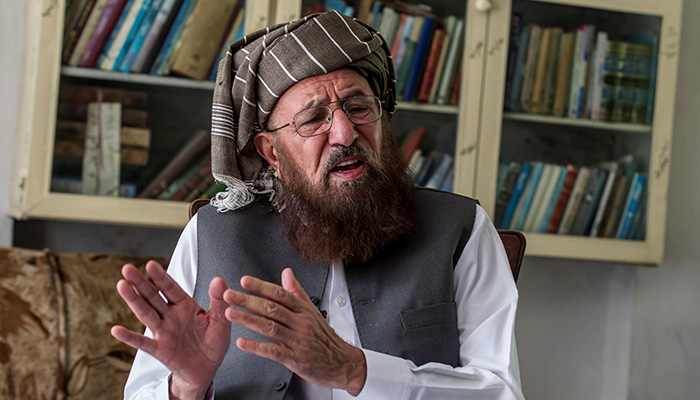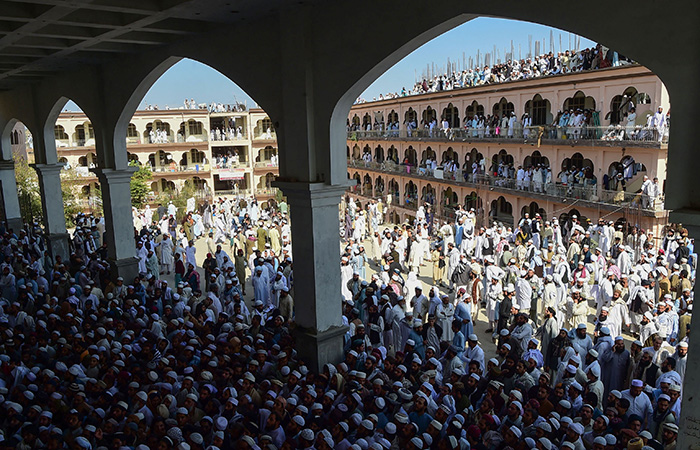Samiul Haq – a patriot, a democrat, a maverick
Despite his hardline religious and political views, the 80-year-old was a patriot and a democrat till the very end, writes Rahimullah Yusufzai
November 06, 2018

The assassination of Maulana Samiul Haq, head of Jamiat Ulema-i-Islam-Sami (JUI-S), at his Rawalpindi residence on November 2 was shocking, though not surprising as a number of religious leaders have been killed in Pakistan in the past.
However, the manner of his brutal murder was upsetting, as the killers used knives to stab the elderly religious scholar in the chest, face, and shoulder before fleeing. His long-time secretary-cum-driver, Ahmad Shah, who had reportedly gone to buy groceries, said he found him in a pool of blood after returning about half an hour later. He has been detained by the police for interrogation.
The identity of the two men who reportedly came to meet the Maulana during this period is not known, but they are said to be the prime suspects.
Contrary to dire predictions by certain politicians, clerics and analysts, there was no violence in the aftermath of Samiul Haq's murder. He was assassinated at a time when the far-right Tehreek-i-Labbaik Pakistan (TLP) was staging countrywide protests, sometimes violent, against the Supreme Court's acquittal of Asia Bibi, the Christian woman accused of blasphemy. It was feared Samiul Haq's murder could fan sectarian strife and add fuel to the fire.
His funeral, held in his native Akora Khattak town in Khyber Pahtunkhwa's Nowshera district, was large but peaceful. His younger brother, Maulana Anwarul Haq, and eldest son, Maulana Hamidul Haq, now named as the head and deputy head, respectively, of the Darul Uloom Haqqania seminary, made an impassioned appeal to his followers and students to stay calm. The appeal certainly had an impact as the situation post-murder remained under control.
The police are still looking for clues while investigating the murder from several angles including the involvement of foreign elements, the possibility of personal enmity, the role of militants who may have been hostile to him, etc.
Identifying the killers and the masterminds may take time, though the late Maulana's family members and supporters have said they suspect the involvement of intelligence agencies of countries unfriendly to Pakistan, such as India and Afghanistan. Samiul Haq's son, Maulana Hamidul Haq, has ruled out personal enmity as a likely cause of murder.
Despite his hardline religious and political views, the 80-year-old Samiul Haq was a patriot and upheld the national cause in the face of external and internal threats. He opposed taking up arms against the state and instead advocated the use of peaceful means to work for enforcement of the Islamic law in Pakistan. He strived to be on the right side of the civil and military establishment despite differing with them on certain issues, such as Pakistan's close relations with the US in the past, particularly in the aftermath of the 9/11 event when Islamabad broke ties with the Afghan Taliban under pressure from Washington.

On the request of the Nawaz Sharif government in 2013-2014, he used his influence to bring the Pakistani Taliban to the negotiations table in a bid to restore peace in the country. In spite of his best efforts, the initiative failed and the massive Zarb-e-Azb military operation had to be undertaken in June 2014 against the inflexible and terrorizing militants entrenched in North Waziristan.
The Maulana was a democrat, blending his call for Shariah with the need for a strong parliament. His belief in democracy was at odds with his policy of maintaining contacts with both the Afghan and Pakistani Taliban, who have been employing force to impose their beliefs and rule on the people.
His party regularly took part in elections, often becoming part of alliances formed by the fractious religious parties to win a few assembly seats. The JUI-S even came into power in Khyber Pakhtunkhwa, as part of the six-party religio-political alliance, Muttahida Majlis-i-Amal (MMA), after winning the 2002 election on the wave of the pro-Taliban, anti-US sentiment following the October 2001 US invasion of neighbouring Afghanistan.
While his party remained a marginal player in the country’s politics, Samiul Haq was a clever politician and religious figure. He managed to twice become a member of the Senate. But his attempt to seek election to the Senate a third time, in March, with the help of a pre-election alliance with the Pakistan Tehreek-e-Insaaf (PTI), didn’t work out. However, he managed to obtain a grant of Rs 300 million from the PTI government in Khyber Pakhtunkhwa in 2016 for Darul Uloom Haqqania along with the promise of a second installment of Rs 275 million. In the face of criticism, Imran Khan defended the decision by arguing that seminaries needed state funding to be streamlined with Pakistan's education sector.
Samiul Haq also publicly endorsed the anti-polio vaccination campaign that has been facing violent opposition from the Pakistani militants. He hosted an event a few years ago at the Darul Uloom Haqqania in presence of Pakistan Tehreek-e-Insaf (PTI) chairman Imran Khan where children were given anti-polio drops. It was an act of defiance as anyone supporting the anti-polio campaign risked the ire of the militants who have been relentlessly attacking the vaccination teams and policemen escorting them.
The octogenarian religious leader's importance was primarily due to his position as the custodian of Darul Uloom Haqqania, the alma mater of numerous known Afghan and Pakistani Taliban leaders, who often added Haqqani to their names to proudly announce their association with the seminary. Samiul Haq's stature grew when he succeeded his father, Maulana Abdul Haq, who was also once elected member of the parliament and wielded immense influence as founder of Darul Uloom Haqqania until his death in 1988.
The Western media and certain Pakistani writers started referring to him as the "Father of the Taliban" and the Darul Uloom Haqqania as the "University of Jihad" though the description was an exaggeration. His influence on the Afghan Taliban, who never gave him this title, was limited as their relationship was basically that of a teacher and student and no more.
Besides, Darul Uloom Haqqania was one among thousands of seminaries in Afghanistan and Pakistan where the Taliban received education and indoctrination. It is true the Afghan government and even Western diplomats approached him in the hope that he would be able to persuade the Afghan Taliban to stop fighting and start talking peace. And when they did his standard reply to such requests was always that the Taliban demand for complete withdrawal of the US-led foreign forces from Afghanistan needs to be accepted before any credible peace process could be undertaken.
Yusufzai is the Resident Editor of The News International in Peshawar
Note: The views expressed are those of the author, and do not necessarily reflect the official policy or position of Geo News or the Jang Group.











